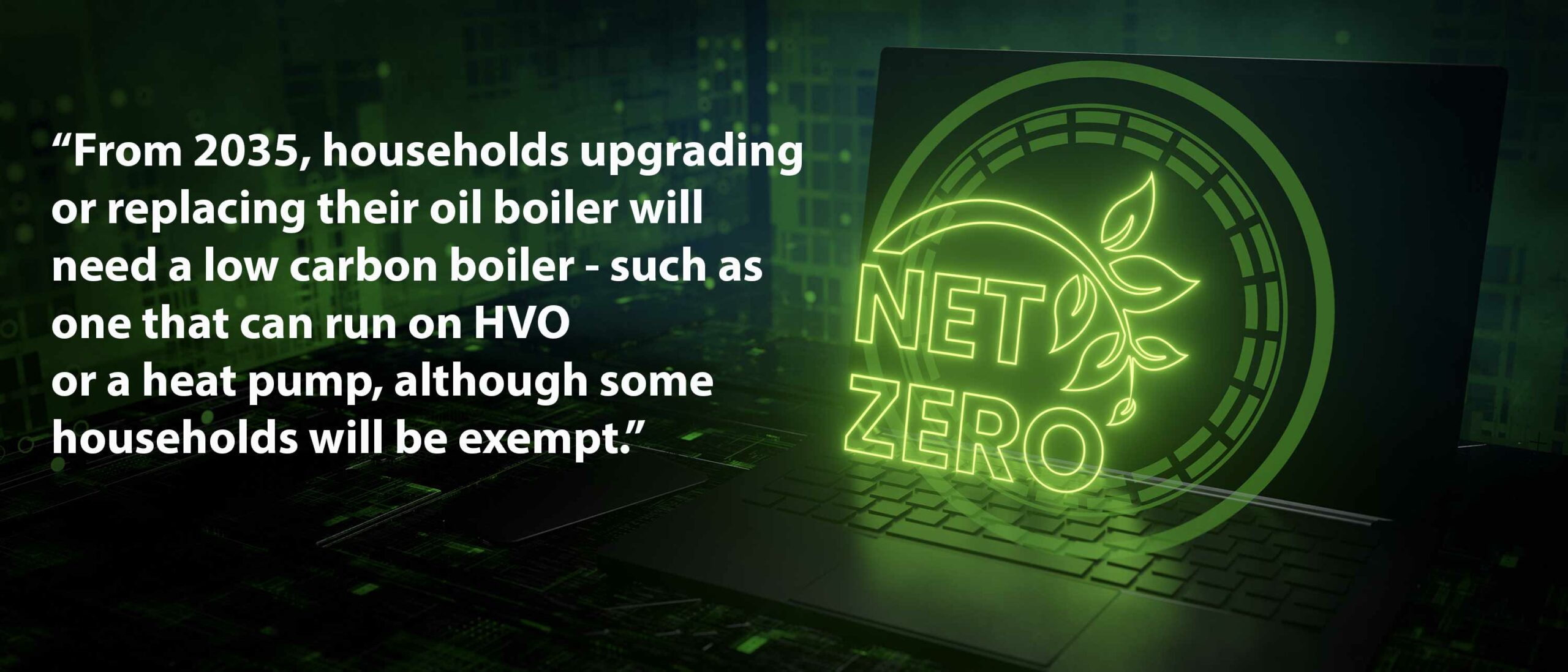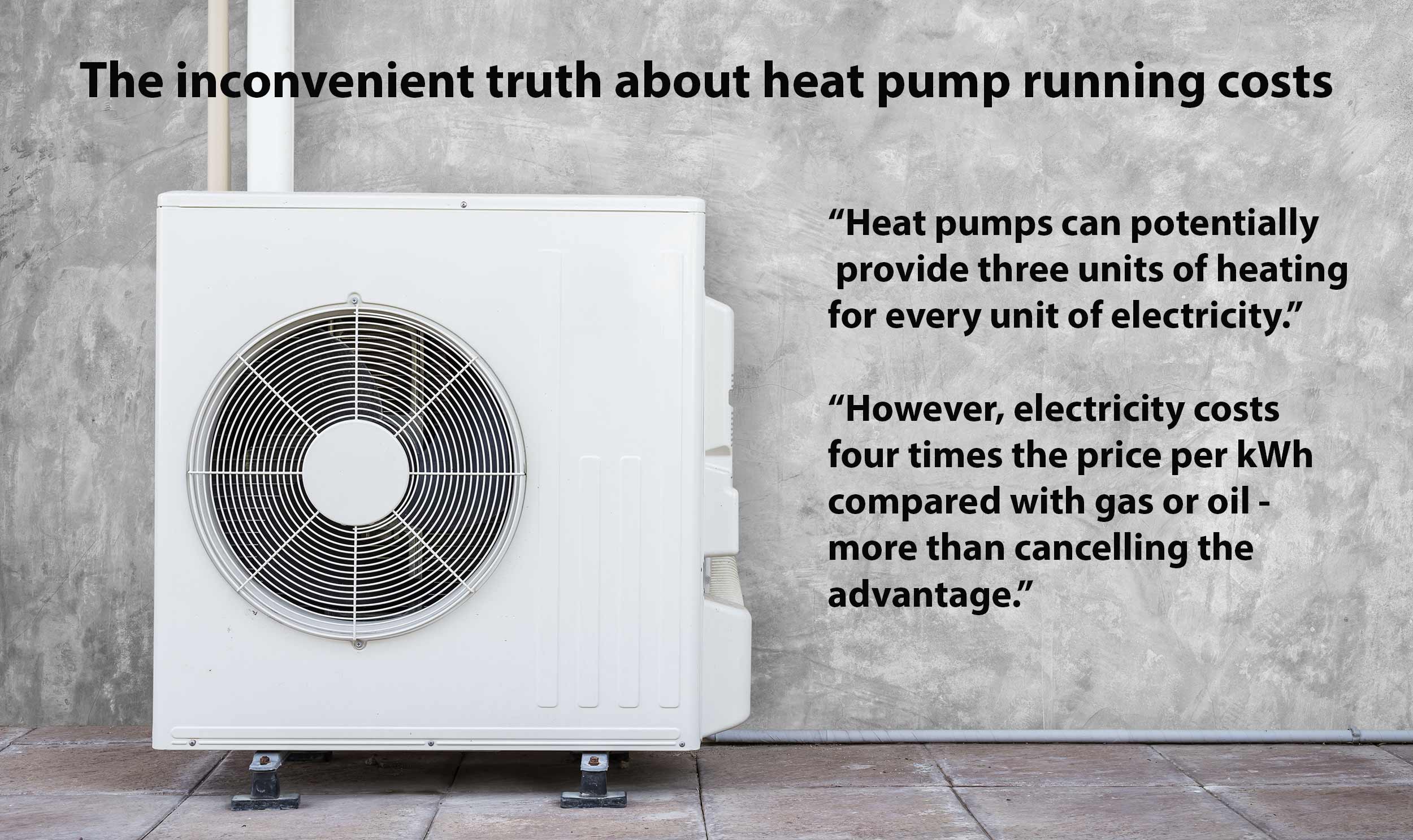
With so much misinformation about the future for households who currently rely on oil-fired heating, we wanted to bring you an article presenting the up-to-date facts so that you can make the right decisions about your home heating. About 1.7 million households (representing 6% of all UK households) rely on oil-fired heating to heat their homes as they are unable to connect to mains gas. As we discuss, households will never be forced to change out their oil-fired heating. From 2035, households looking to replace their oil-fired boiler will need to use a low-carbon boiler, for example, a boiler that runs on Hydrotreated Vegetable Oil (HVO) or a heat pump. The oil boilers we install already are 100% compatible with HVO without modification. Upgrading now to one of our ultra-efficient boilers before 2035 will immediately slash your heating costs due to their 97.4% efficiency and allows you to benefit from HVO as it becomes more widely available.
Households considering changing out to a heat pump should consider such a radical move with care. Heat pumps are currently not suited to many rural homes due to their high upfront cost, the need for expensive radiator and insulation upgrades, and the high cost of electricity. Running costs can currently be significantly higher than oil-fired heating. Because heating oil has not experienced the substantial price increases seen with wholesale electricity, oil-fired heating remains the cheapest form of home heating available (alongside gas). Households currently looking to substantially reduce their heating bills would be far better upgrading to one of our ultra-efficient, future-proofed oil boilers, as they typically pay back within months without the need to replace radiators or add insulation.
What’s all this about oil boiler ‘bans’?

In recent months, there has been huge confusion about the future of oil-fired heating, caused by an elongated consultation exercise by the UK Government, which was made worse by inaccurate reporting in the Media. Thankfully, some clarity has now been gained from the Government, and also the Labour Party (which, based upon opinion polls, is expected to form the next Government).
There is general consensus among politicians from all parties about the need to reduce the use of fossil fuels, to achieve net zero emissions by 2050. As part of this, the UK Government wants to ensure that, by 2050, many households that currently rely on conventional heating oil to heat their homes have migrated to a low carbon alternative. This could be a boiler using HVO or a heat pump. The UK Government has announced that:
- households currently running oil-fired heating systems will never be forced to replace their heating system with a low carbon alternative
- households choosing to replace their existing oil boiler from 2035 will need to opt for a low carbon option (such as a boiler using HVO or a heat pump). The Government will provide an exemption to households who will most struggle to switch to low-carbon heating alternatives
- it will fully explore low carbon heating options for off-grid households, which includes HVO.
The Labour Party has indicated that, if elected at the next General Election, it will not bring forward the current Government’s 2035 timescale for requiring replacement boilers to be low carbon.
Heat pumps are currently not an attractive short term solution, being more expensive than oil-fired heating to install and run
While heat pumps may be promising heating technology long term for those with gas-fired heating in well insulated homes, their use in many oil-fired households is far more problematic. On top of extremely high upfront costs, high electricity costs have put paid to the promise of lower heating costs, so please treat any claims from heat pump proponents that running costs are lower with a pinch of salt. That is simply impossible with the current price of electricity per kWh.
How many households are realistically going to ‘invest’ thousands of pounds in a system that delivers higher bills, year after year? There’s absolutely no sign or expectation of electricity prices coming down to their pre-2021 levels. Not unsurprisingly, national take-up of heat pumps has been very low. Across the households we serve, interest in migrating to a heat pump has been incredibly low, with the vast majority opting to upgrade to an ultra-efficient oil-fired boiler to substantially reduce heating bills. Additionally, cost-effective enhancements, such as smart thermostats, are becoming increasingly popular.
At the present time, heat pumps are unsuitable for the vast majority of oil-fired households. This is because:
- the upfront costs of installing a heat pump are generally much higher than a new ultra-efficient oil-fired boiler
- additional, often unexpected, costs can be huge, particularly in older, less well insulated buildings. For heat pumps to operate at their maximum efficiencies, radiators need to work at much lower water temperatures than oil-fired boilers deliver. Many rural households may need to spend thousands of pounds installing new radiators and insulation. If heat pumps need to produce higher water temperatures, efficiencies plummet and bills dramatically increase
- electricity prices are very high compared with heating oil making running costs substantially higher than oil-fired heating. Heat pumps require electricity to run. Wholesale electricity prices increased rapidly from the second half of 2021, and will increase from January 2024. In comparison, heating oil has not experienced the same price increases seen with electricity, making oil-fired heating the cheapest form of heating available.

One of the key arguments for heat pumps put forward by heat pump proponents is that they can potentially generate around three units of heating (kWh) for every unit of electricity, which sounds very impressive. We have lost count of the number of times that this argument has been used to convince people that heat pumps are substantially cheaper to run than conventional gas or oil heating. What the heat pump proponents usually neglect to mention is that the cost per kWh for electricity is much higher than the cost per kWh of gas (or oil), so any efficiency gains with heat pumps are more than cancelled out. With current rates as they are, heat pumps will inevitably cost more to run than conventional oil or gas heating. According to MoneySavingExpert, for the period 1st October to 31st December 2023, the average unit rate for electricity is 27.35p per kWh, compared with 6.89p per kWh for gas (with oil being similarly priced to gas). So, the average electricity price per kWh is about four times the price per kWh for gas or oil heating. Unless there is a substantial drop in the price per kWh differential between electricity and gas (and oil), heat pumps will never deliver on their promise of lower running costs.
Some heat pump proponents clutch at straws by saying that households can make use of special electricity tariffs to reduce costs, just like for electric cars. While it makes a great deal of sense charging an electric car overnight when national electricity demand is low (when there can be special rates), people need to heat their homes when national electricity demand is actually highest. Often, those special tariffs (with cheaper prices at off-peak times) are more expensive than the average electricity price shown above at peak times. Differential charging to reflect the changing national demand for electricity is going to make heat pumps even more expensive to run.
After paying much greater installation costs than for a conventional oil (or gas) boiler in the hope of reduced running costs long-term, many early adopters of heat pumps are dealing with the unpleasant reality of increased heating bills too. While ‘enhancements’ such as smart thermostats, thermostatic radiator valves and turning down the system thermostat can significantly reduce heating bills, and improve the apparent attractiveness of a heat pump proposal, these can, obviously, be applied to oil-fired heating systems too, with the same positive effect. Furthermore, comparing a new heat pump with an old, inefficient oil or gas boiler with 60-70% efficiency is not really a fair comparison, as the true comparison should surely be against an ultra-efficient modern oil-fired boiler with 97.4% efficiency? In a true like-for-like comparison, there’s simply no getting away from the fact that heat pumps are held back by the high relative price per kWh for electricity. Until this changes significantly, there’s simply no financial justification for the larger upfront installation costs and greater inconvenience associated with heat pumps.
You may be interested in reading the following articles:
The Telegraph: ‘Six Reasons Not to Buy a Heat Pump’ (September 2023)
BBC News: Government Heat Pump Scheme Misses First Year Target (Jun 2023)
There are many short-term opportunities to reduce emissions and heating bills, with HVO potentially replacing heating oil in the long term
In the short term, we recognise that many households are keen to lower their carbon footprint and reduce heating bills at the same time. This can be achieved by substantially reducing oil consumption. As detailed in our Heating Guides, we see huge potential for households to do this immediately by:
- installing an ultra-efficient replacement oil-fired boiler, to immediately reduce heating bills by up to 37%
- turning down the heating thermostat
- fitting thermostatic radiator values to avoid overheating rooms and not heating unoccupied rooms
- fitting a smart thermostat and smart radiator values
- powerflushing a central heating system so that it runs more efficiently.
If the majority of households implemented these measures in the short term, there would be a substantial reduction in heating costs and emissions.
Upgrading to one of our future-proofed oil-fired boilers will allow you to achieve substantial reductions in heating costs in the short-term using conventional heating oil due to an efficiency of 97.4%, compared with 60-70% for a typical old boiler. This means that payback can be achieved within months, as explained in our guide Replacing Your Existing Oil Boiler with an Ultra-Efficient Model Can Save Over £20,000. The oil-fired boilers we supply and install are already 100% compatible with HVO without modification, and the oil tanks we install are too. Our oil boilers are just as efficient, and produce the same amount of heat, with HVO as they do with conventional heating oil. HVO fuel is synthetically made from vegetable oils or animal fats and is a fossil-free, environmentally-friendly alternative to traditional heating oils.
Compared with heat pumps, migration to an HVO-ready boiler is a much more attractive short-term path for households because of much lower upfront costs and immediate savings in annual heating bills. In the long term, we are very excited by the potential of HVO to replace conventional heating oil by 2050 so that the Government successfully meets its net zero emissions target.
Households opting for the HVO boiler route can avoid the huge costs and disruption associated with a heat pump installation. Replacement of radiators or additional insulation would not be necessary, for example. By opting for an HVO-compatible boiler, you can decide if and when to change from using conventional heating oil to HVO. Over time, the availability of HVO is expected to increase rapidly as the proportion of households using HVO increases.
You may be interested in reading the following articles and information:
UK Parliament: Energy Act 2023 Government Bill (Nov 2023)
George Eustice: Government Amends the Energy Bill and Supports Renewable Liquid Fuels (Sep 2023)
Business Cornwall: Landmark HVO Trial Hailed a Success (Oct 2023)
For more information, or to get in touch, please contact us.

